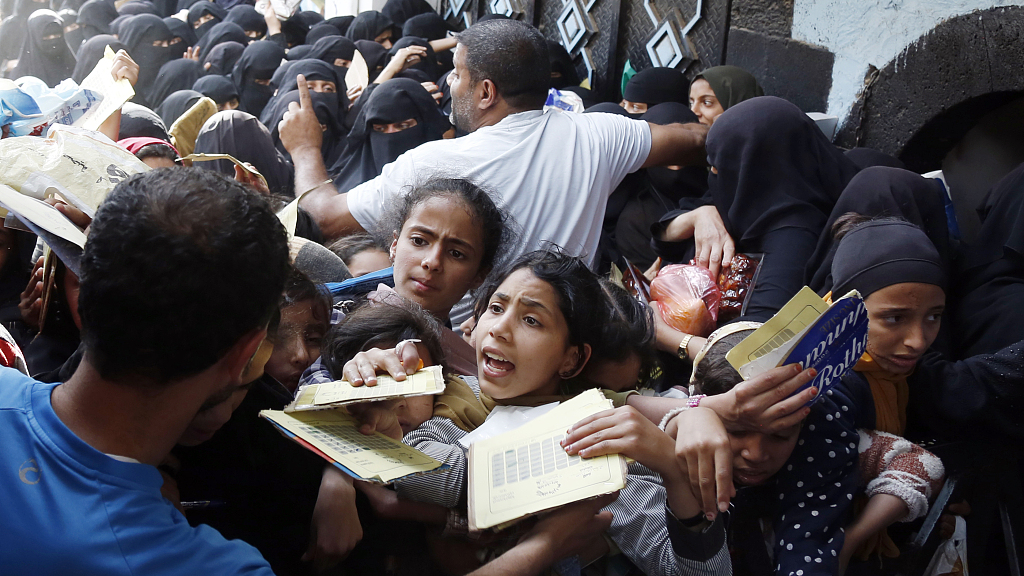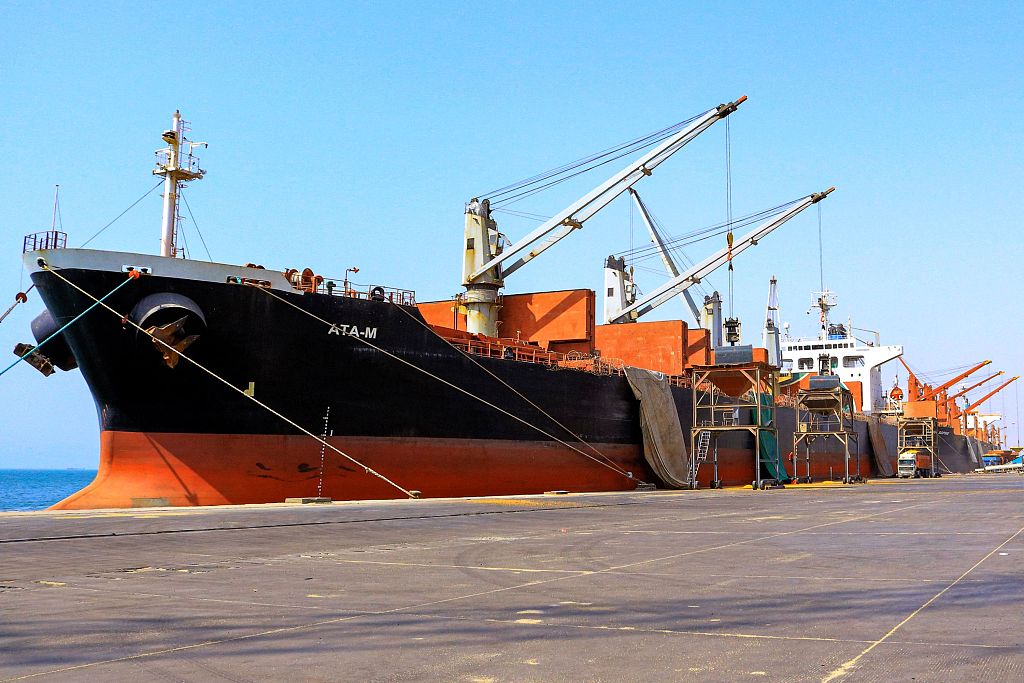
Girls from families affected by eight years of the Yemen War receive free meals provided by a charitable kitchen at Mseek area in Sana'a, Yemen, March 23, 2022. /CFP
Girls from families affected by eight years of the Yemen War receive free meals provided by a charitable kitchen at Mseek area in Sana'a, Yemen, March 23, 2022. /CFP
Editor's note: Bobby Naderi is a London-based journalist, guest contributor in print, radio and television, and documentary filmmaker. The article reflects the author's opinions, and not necessarily the views of CGTN.
March 25 marks the eighth anniversary of the war in Yemen. Millions of people have been impacted by the staggering dimensions of the war, which has been a continuing nightmare for everyone involved. Given the conflict's humanitarian impact, priority should be given to international attempts to end the conflict before it enters the ninth year.
It is gratifying to learn that Saudi Arabia and Iran, backed by China, signed a historic pact to end their hostilities for regional and international security considerations. The agreement has offered a unique opportunity for Tehran, Riyadh and their strategic partners to support negotiations and diplomacy to end one of the world's worst humanitarian catastrophes.
In the so-called more civilized world, Western governments should be encouraging these efforts too, ensuring that it would be on their political agenda, even if it is a goal that won't be reached without a struggle. In addition to diplomatic measures, the West may offer the Yemeni people aid and assistance. The United States, the European Union and others in the West owe it to the Yemeni people to aid in humanitarian operations and offer resources to lessen their suffering.
Threatening, consequential realities
The volatile region of the Middle East has become more unstable as a result of the Yemeni conflict. Political tensions between Tehran and Riyadh have been heightened throughout the fighting, with significant foreign policy consequences. More instability and violence could result from the ongoing tensions and distrust, unless they change course.
Terrorist groups like the ISIL and Al-Qaeda in the Arabian Peninsula have flourished at the expense of Yemeni civilians. The deadly struggle has been used by the terrorist organizations to establish strongholds around the nation. The resulting insecurity has provided these groups with the opportunity to spread their power and reach, recruit new members, and launch attacks on regional targets.
Yemen is strategically situated at the southern entrance to the Red Sea, a vital transportation route for commercial ships and oil tankers. Insecurity issues for shipping in the area, including piracy and vessel attacks, have been brought on by the conflict. The result: far less food and medicine for the civilian population. The fighting has caused ports to close, which has hampered the movement of commodities into and out of the area.

The Panama-flagged bulk carrier ship ATA-M is moored at the Red Sea port of Hodeida in western Yemen, April 5, 2022. /CFP
The Panama-flagged bulk carrier ship ATA-M is moored at the Red Sea port of Hodeida in western Yemen, April 5, 2022. /CFP
The consequential realities have made it easier for people to be trafficked and smuggled. Many individuals have been forced to leave their homes in search of protection and security, which has resulted in widespread poverty. Smugglers and human traffickers continue to prey on the weak and the poor. Their criminal networks have had a safe haven to operate and expand operations.
Disturbing, inhumane state of perdition
There are now more weapons in Yemen than before. While the Saudi-led coalition has received munitions from the U.S. and others, the impoverished Houthi rebels have been charged with obtaining arms and backing from Iran. The hostilities have given some non-state actors the chance to obtain these weapons, with major security repercussions for everyone involved.
Security on a regional scale can be seriously threatened by the proliferation of weapons. The armed conflict has been exacerbated by the flow of armaments into the area. In addition to escalating the fighting, the spread of weapons has fueled a cycle of violence in which both sides compete with one another for advantage and control. The use of weapons to advance objectives, such as attacks on civilian targets or the trafficking of illegal substances, has increased instability and security.
A crucial turning point in the war has occurred on its ninth anniversary. The United Nations and the international community have overwhelmingly backed the Iran-Saudi deal to normalize ties and end hostilities. The Stockholm Agreement and the Riyadh Agreement, which aim to put an end to hostilities and appoint a transitional administration in Yemen, now have the chance to be implemented. The onus is on top diplomats in Tehran and Riyadh to uphold these UN-backed accords, and ensure they are respected and fulfilled.
Under the new deal signed in Beijing, Tehran and Riyadh have agreed to work together to ensure there is no dead end on the political horizon. Just as important, this diplomatic achievement has strengthened China's international reputation as a pro-peace actor and neutral country in geopolitical disputes. Under the circumstances, Beijing is expected to keep up its proactive support of ongoing diplomatic efforts. Just like China, the international community, the West in particular, is also expected to work selflessly and without bias to work to this end. March 25 should be the start of the end for Yemen's disturbing, inhumane state of perdition.
(If you want to contribute and have specific expertise, please contact us at opinions@cgtn.com. Follow @thouse_opinions on Twitter to discover the latest commentaries in the CGTN Opinion Section.)